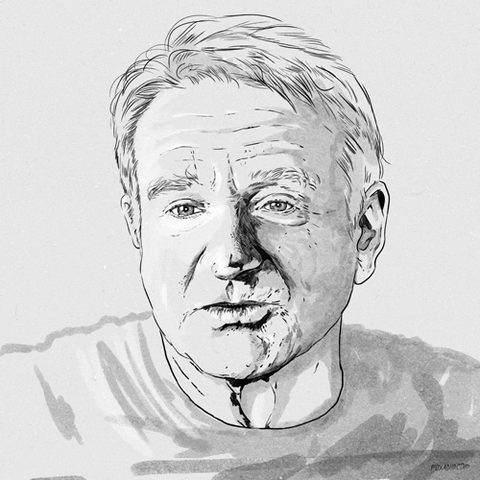Robin Williams
The death of Robin Williams three years ago was a loud reminder of the severe state of mental health in the United States. There has been a lot of talk about whether suicide is a choice or a disease. Regardless of what you believe, I am here to fight for a cause. The cause that we all talk about but rarely act upon, which is the topic of mental health.
Depression affects an estimated 19 million adults. Depression can come on after an event or randomly. Often, people are embarrassed about their lack of joy, so they try to hide it. Or, even worse, their families get frustrated with that person's constant feeling of being down. Depression, as in the case of Robin Williams, too often results in suicide. This is when it becomes so bad, when the hurt and pain is so deep, that the only possibility of releasing the pain is taking your own life. These people are stuck because their brain is telling them that there is no way, no answer and no light. No matter what you do for these people—take them out, buy them something do something nice for them—it will not change the chemicals that make them feel like they are in a very dark place.
Here is a direct quote from Harvard Health Publications that is written all too beautifully: "Research suggests that depression doesn't spring from simply having too much or too little of certain brain chemicals. Rather, depression has many possible causes, including faulty mood regulation by the brain, genetic vulnerability, stressful life events, medications and medical problems. It's believed that several of these forces interact to bring on depression. To be sure, chemicals are involved in this process, but it is not a simple matter of one chemical being too low and another too high. Rather, many chemicals are involved, working both inside and outside nerve cells. There are millions, even billions,of chemical reactions that make up the dynamic system that is responsible for your mood, perceptions and how you experience life. With this level of complexity, you can see how two people might have similar symptoms of depression, but the problem on the inside, and therefore what treatments will work best, may be entirely different." (http://bit.ly/1sxSQTM)
Around 200 B.C., there was an ancient Chinese Text written ("HuangDi NeiJing andSuWen," chapter 22) that describes depression: "In the beginning of the disease, the patient appears to be unhappy, his head is heavy, his two eyes are red and stare straight-forward. When the disease is severe, the patient will have oppression over the chest and restless. When treating, prick the acu-points ...and cease the pricking after the color of the patient's complexion has turned into normal."
So, how can acupuncture help with depression? It has been studied over and over again that inserting a needle at a specific site can cause the release or regulation of endorphins, enkephalins, nor-epinephrine, serotonin and dopamine, which are all linked to depression. I really could talk for hours about how much acupuncture can correct these brain and chemical imbalances, and I can't emphasize enough about how much people actually feel better when getting acupuncture. However, just as described above, it's a very complicated process. Sometimes it takes a bit more than a few needles. I have an herbal formula that is a powdered tea used to treat severe depression. It doesn't help prevent it, but can help take the edge off. I also recently just stocked up on another two formulas from the line of pills I carry that make a huge difference. I have had many, many patients tell me how wonderful the Chinese herbal therapy works.
Besides herbal therapy, there are always things you can do at home that can help with feelings of depression. Exercise! This doesn't mean buy a leotard and sign up for jazzercise. It means find a way that you can exercise and enjoy it daily. This can be as simple as a daily walk or as complex as advanced weight lifting. Exercise is an essential factor in overcoming depression.
The last major factor I find helps with depression is diet. What you eat can absolutely make you depressed. I often see high sugar, dairy or gluten-filled diets have the highest propensity to emotional imbalances. If you're feeling down, it's not a bad idea to stop all of them. It has been studied for years about the link between calcium and depression. Drinking carbonated beverages decreases calcium absorption/uptake. Most often, calcium is deficient when major cases of depression happen. However, calcium has a lot of other mineral friends it binds with, which is why I always suggest people go to a nutritionist before starting supplements.
"There are many reasons why depression can happen, but there is something you can do about it! "Take the first step in faith. You don't have to see the whole staircase, just take the first step."— Dr. Martin Luther King Jr.
When you subscribe to the blog, we will send you an e-mail when there are new updates on the site so you wouldn't miss them.



Comments